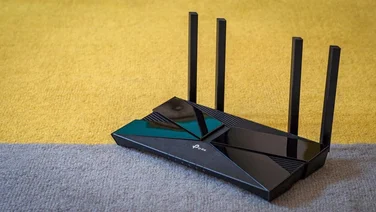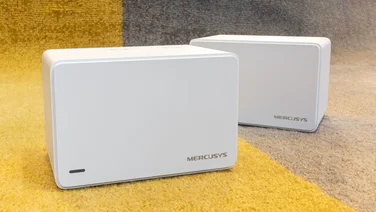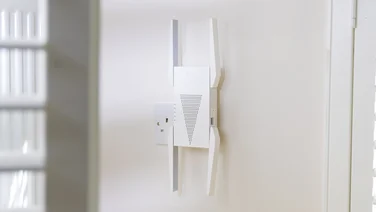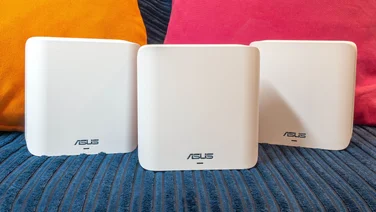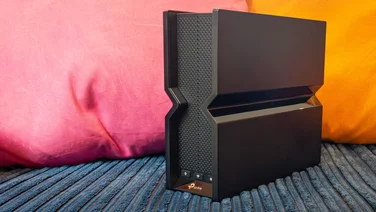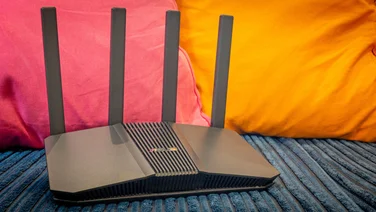To help us provide you with free impartial advice, we may earn a commission if you buy through links on our site. Learn more

- USB 3 socket on both nodes
- Novel powerline backhaul option
- Stuffed with powerful software features
- Interface isn’t beginner-friendly
- Inconsistent whole-home performance
We’ve previously had positive words to say about the Asus ZenWiFi AX, a highly capable and configurable Wi-Fi 6 mesh system. This new Hybrid edition retains the boxy look of the original, and adds a new trick: its two units can communicate via your mains circuit, guaranteeing a stable backhaul connection even over long distances and through thick walls.
The ZenWiFi AX Hybrid is different to the regular AX. It uses dual-band Wi-Fi rather than tri-band, and Asus cites a slower top speed for the 5GHz radio of 1.2Gbits/sec – the baseline speed for Wi-Fi 6. Still, if top performance isn’t a priority, the ZenWiFi AX Hybrid is a versatile mesh, and the slimmed-down hardware helps keep the price down to a fairly palatable £270.
READ NEXT: Our guide to the best wireless mesh routers to buy
Asus ZenWiFi AX Hybrid review: What you need to know
The ZenWiFi AX Hybrid is a Wi-Fi 6 mesh system, which can either replace your existing router or extend its wireless reach. For now, it’s only available only in packs of two units, although Asus shortly intends to make add-on units available at £140 each. Other Asus routers and mesh units can also be used to extend the system via the AiMesh platform, although performance and features will, naturally, vary.
Each ZenWiFi station contains a 2.4GHz radio rated at 574Mbits/sec, alongside that 1.2Gbits/sec 5GHz radio. Powerline networking is supported using the AV1300 HomePlug AV2 MIMO standard; as the name implies, this claims a maximum speed of 1.3Gbits/sec, although none of these figures really bears much resemblance to the performance you’ll see in the real world.
Aside from its integrated HomePlug support, the ZenWiFi AX Hybrid is notable for its wide range of software features, including parental control, network security and VPN modules. Most unusually for a mesh platform, it even offers a USB 3 port on each unit for connecting external devices.
Asus ZenWiFi AX Hybrid review: Price and competition
For a dual-band Wi-Fi 6 mesh, the ZenWiFi AX Hybrid is pricey. You’ll pay £270 for the two-node package, while TP-Link’s Deco X20 gives you three nodes for £230, and the Amazon Eero 6 provides a pair for £219. A twin-pack of Netgear’s dinky Orbi RBK352 units costs a mere £170 and, while Xiaomi’s Mesh System AX3000 isn’t officially available in the UK, you can buy it from an import site such as AliExpress for a trifling £105.
To be fair, none of these alternatives has the powerline capability of the ZenWiFi AX Hybrid and the AX Hybrid is much cheaper than most tri-band systems. Netgear’s Orbi RBK752 costs £370, while the original Asus ZenWiFi AX sells for £390 and the powerful Netgear Orbi RBK852 pushes the price up to a huge £665.
For the ultimate mesh you could even check out the Wi-Fi 6E-enabled Netgear Orbi RBKE963. This triple-node system delivers outstanding performance, but at £1,500 it makes the ZenWiFi AX Hybrid look positively cheap.
Asus ZenWiFi AX Hybrid review: Hardware design
The ZenWiFi AX Hybrid stations are a little on the large side, standing 209mm tall and 148mm wide, but the design is clean enough to blend into most settings. Each unit has a belly-button on the front which can be pressed to activate WPS pairing, with an LED surround that glows various colours to show connection status.
At the rear sit three Gigabit Ethernet sockets, two labelled “LAN” and one labelled “WAN”. In fact, once you’ve connected one station to your modem or router, the WAN port on the remote unit becomes a third LAN connector – or you can use it for wired backhaul, if neither wireless nor powerline networking floats your boat.

The nice surprise is that there’s also a 5Gbits/sec USB 3 port on each unit, which can be used for storage or internet connectivity. We’re used to seeing these ports on Asus’ standalone routers but they’re a real rarity on a mesh.
Asus ZenWiFi AX Hybrid review: Software features
The ZenWiFi AX Hybrid uses the same web management interface as the manufacturer’s regular routers (such as the Asus RT-AX82U) and it exposes a very similar set of features and settings. Highlights include per-device parental controls and advanced QoS and traffic analysis modules, to help identify which devices and apps are eating up your bandwidth. Asus’ AiProtection Pro security module can scan your network for vulnerabilities, block access to malicious sites and repel incoming attacks.

Another strength is VPN support. A built-in VPN server allows you to access your home network securely over the internet, while outbound traffic can be routed through your choice of third-party VPN. You can even set up different VPN connections for different devices; it’s by far the best VPN support I’ve seen on any mesh, and better than most high-end routers.
As noted above, a single USB 3 port on each unit adds another layer of versatility. You can share external storage across the network, or Mac users can configure a USB drive as a Time Machine destination. 3G and 4G mobile internet adapters are supported, too, and it’s even possible to plug in a standard Android phone and use that as your WAN connection, a wonderfully easy stopgap should your broadband temporarily go down.

One module that’s specific to the ZenWiFi AX Hybrid is mesh management. By default, backhaul and client routing are handled automatically but, if you want to get more hands-on, you can choose for yourself which backhaul transport to use and bind specific clients to a particular ZenWiFi station.

If I’ve one criticism it’s that the web interface extends across so many pages and panes that it can feel quite overwhelming, and the Asus Router mobile app is barely any more accessible, with its own proliferation of buttons, tabs and menus. Advanced users will love the breadth of features and user-configurability of the Asus, but anyone seeking simplicity may well be happier with a TP-Link Deco mesh or one of Netgear’s numerous Orbi systems.

Asus ZenWiFi AX Hybrid review: Performance
Dual-band meshes often suffer from compromised performance, as backhaul traffic eats into the available bandwidth. My expectations for the ZenWiFi AX Hybrid were especially low, since its 5GHz radio isn’t particularly fast and is limited to a channel width of 80MHz, rather than the maximum 160MHz.
To test real-world performance, I started by setting up the two units in the study and bedroom of my home – confirming in the web interface that the connection quality was “Great” – and leaving the mesh settings on automatic. I then plugged an Asus Drivestor 4 Pro AS3304T NAS into one of the LAN ports on the primary unit, and used a laptop to measure read and write speeds from various spots in my home.
Here are the speeds I saw, along with the results achieved by some other mesh systems for comparison.


As you can see, the AX Hybrid has an unusual performance profile. I saw excellent download speeds when my laptop was in the same room as one of the Zen WiFi units and upload performance was strong all around the house, but download speeds dropped sharply whenever I strayed a room away from a mesh node.
I experimentally tried moving the secondary ZenWiFi unit into the downstairs living room to see if this would improve matters, but it didn’t: downloads in the bedroom and bathroom were much slower, while the living room and kitchen saw only a small benefit.
All of this testing was carried out using a 5GHz backhaul connection between the two ZenWiFi stations, as automatically selected by the system. I also tried manually switching to powerline backhaul: this instantly slashed the extender node’s bandwidth to around 7.5MB/sec, even though the units were only a single room apart.
That’s to be expected from a powerline connection. It’s usable for everyday work and even one or two video streams but it’s nowhere near the heights of a decent Wi-Fi connection. It’s possible that the wiring in your home will allow a faster connection but, frustratingly, the only real way to test the amenability of your ring main is to get hold of a powerline system and try it out.
Asus ZenWiFi AX Hybrid review: Verdict
Asus advertises the ZenWiFi AX Hybrid as a mesh solution for homes with thick walls, and the powerline backhaul option can indeed extend your wireless network beyond any inconvenient masonry. Don’t expect Wi-Fi 6-class performance, however: you might be just as well off investing in a simple powerline extender to work with your current router. Conversely, if you’ve no need for HomePlug capabilities, you can save money by going for a regular mesh.
The best reason to choose the ZenWiFi AX Hybrid is for its huge range of features and configurability. In these areas, Asus’ firmware puts all other meshes to shame – and the AX Hybrid is a cheaper way to get it than springing for the full-on tri-band ZenWiFi AX.
Ultimately, however, it’s very hard to overlook such a mediocre showing in our performance tests. There are plenty of rival meshes that will provide more consistent speeds at lower prices, so unless you’re really enamoured by the Asus way of doing things, the ZenWiFi AX Hybrid is not the mesh to go for.

